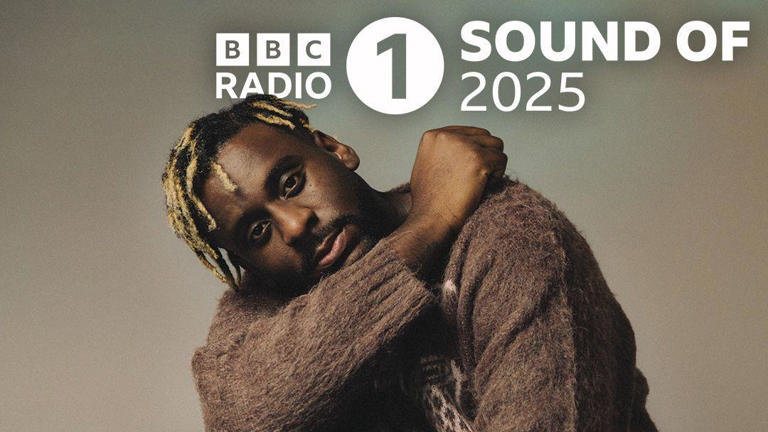Rising pop star Myles Smith can still remember the first time he felt famous.
“This might sound trivial,” says the singer, “but I was playing a concert where I asked the audience, ‘Does anyone have cookies?’
“And within about 10 minutes, the whole dressing room was full of cookies.
“It was the best thing ever.”
Since that gig, the 26-year-old’s career has only grown bigger.
Last year, he scored his first major hit with Stargazing, a feel-good foot-stomper that became the biggest-selling British single of 2024, and even featured on Barack Obama’s end of year playlist.
Now, he’s been voted into fourth place on BBC Radio 1’s Sound of 2025, marking him out as one of the year’s most promising new talents.
And in March, he’ll receive the Brit Awards’ Rising Star prize – following in the footsteps of Sam Fender, Adele and Rag ‘N’ Bone Man.
Smith confesses he learned about the accolade while in the grip of a ferocious hangover.
“The night before, I’d tried to go drink-for-drink with some people who were a lot more experienced than me, and we actually had to call a doctor to my Airbnb,” he cringes.
“Finding out I’d got a Brit Award brought me back to life more than any vitamin C ever could.”
It was, he says “the most LA I’ve ever felt”.
It’s certainly a long way from his upbringing in Luton.
Born to a working class British-Jamaican family, he was a bright and happy kid, who grew up singing along to his mum’s Motown records.
His first true musical discovery was Coldplay’s Yellow (“it resonated with me, even though I didn’t understand a word of it”) but Luton’s social and cultural diversity meant he was exposed to hundreds of different genres.
“I went through a lot of stages,” he says. “I was a huge Green Day fan at one point. I even went through a bit of a Screamo phase.”
Before long, he was writing his own songs – initially by dreaming up melodies and lyrics to instrumentals he’d found on YouTube, then creating originals on a guitar he’d been given for his ninth birthday.
“I remember writing this song called Dream Girl, when I was 11,” he says.
“It was about a girl at school, and it was bloody awful – but I sang it at school assembly anyway.
“Terrible decision. She realised it was about her and avoided me every day after that.”
Undeterred, he started playing at open mic nights around the town – covering artists like Ed Sheeran and Marcus Mumford while fine-tuning his distinctive folk-pop style.
For a long time, however, music was a side hustle. After completing a sociology degree in 2019, Smith set up his own business, specialising in management and strategic development, and was turning a healthy profit by the time he was 23.
“I was quite comfortable,” he says. “But I understood quite early on that just because I’m good at something, it doesn’t necessarily mean I’m passionate about it.”
He ploughed his earnings into studio sessions, recording an eight-track album called Scars in 2020. But it wasn’t until his haunting cover of The Neighbourhood’s Sweater Weather went viral in 2022 that he felt confident enough to pack in his day job.
“Money has never been the way I measure my success, but it was definitely scary,” he says.
“It started off very much like plunging into an ice bath and feeling the shock. Like, ‘OK, this is real. I don’t have a consistent salary coming in, and I don’t have the security of knowing how long this is going to take.’
“But it was a matter of switching mentality – so I wasn’t looking at what securities I had lost, but what opportunities I’d gained.”
Any apprehension was short-lived.
With a growing online fanbase, Smith started interspersing TikTok cover versions with snippets of originals.
The one that made everyone pay attention was Solo – whose devious wordplay was so obviously memorable (“Why’d you get me so high/ To leave me solo“) you couldn’t quite believe no-one had thought of it before.
Released independently in 2023, it earned Smith his first UK chart hit and, subsequently, a deal with RCA Records.
But he continued to build his audience organically, gigging constantly while posting on TikTok and YouTube.
He’s got an interesting take on social media. While artists like Halsey and Florence Welch have expressed frustration at record label pressure to create viral videos, Smith calls TikTok a “meritocratic system” that rewards the effort you put in.
“There’s a difference between the chase for virality and building an audience,” he reasons.
“If your objective is to go viral, then you’re always going to be fighting a losing battle. But if your objective is to establish a community and a place where your music belongs, it becomes a lot more rewarding.”
When he’s not sharing music, there’s a thoughtful tone to his social posts. In one recent note, he addressed people who said his music had “saved their lives”.
“I need you to know, it wasn’t my music, it was you,” he wrote. “I know this because I’ve been where you are. I’ve clung to songs in the dark searching for something – anything – that made me feel like I could keep going.
“But music didn’t save me. What saved me was the smallest part of me that chose to stay, even when it hurt.
“My songs might walk beside you, but it’s your strength that carries you forward.”
That empathy is baked into Smith’s lyrics. His most affecting songs, such as River and Wait For You, are covenants of support for a friend who’s drowning in their troubles.
His breakout hit, Stargazing, is also about a moment of human connection – looking into the cosmos and realising “the person we fall in love with has been there our whole life”.
He’s previously claimed the track was inspired by a sunset in Malibu, but it turns out that that’s a little white lie.
Smith actually came up with the folky, clap-along chorus and its central lyric (“You and I stargazing/ Intertwining souls“) while eating tacos and salsa with his co-writers, Peter Fenn and Jesse Fink, early last year.
They were so inspired that they demo’d the song in just 15 minutes – just as the sun was setting over Malibu.
“Somehow, that moment gave the lyric a meaning,” says the singer. “It was an afterthought, but it was a very beneficial afterthought.”
He started posting snippets of the song online almost immediately, and “from the very first post, the reaction was explosive”.
There was only one problem: they hadn’t finished the verses.
For a month, they frantically traded voice notes and Zoom calls, pulling the song into focus in time for a May release. Since then, it’s been streamed more than 600 million times.
“It’s quite wild,” says the singer. “It’s still getting played, seven or eight months down the line, which is awesome.”
Smith ended 2024 with a clutch of honours – from his first Brit Award, to being named BBC Introducing’s Artist Of The Year – and the release of his new EP, …A Minute.
At the start of 2025, he’s juggling writing sessions for his debut album with a hectic touring schedule that sees him playing 36 shows in 60 days in 16 countries. But if that sounds daunting, he’s prepared.
“It’s a lot, for sure, but I used to stand on the edge of my sofa and pretend I was at Glastonbury. So being able to tour, at whatever scale, is just such a privilege that it doesn’t feel like hard work.”
What’s more, he’s guaranteed to get free cookies.



